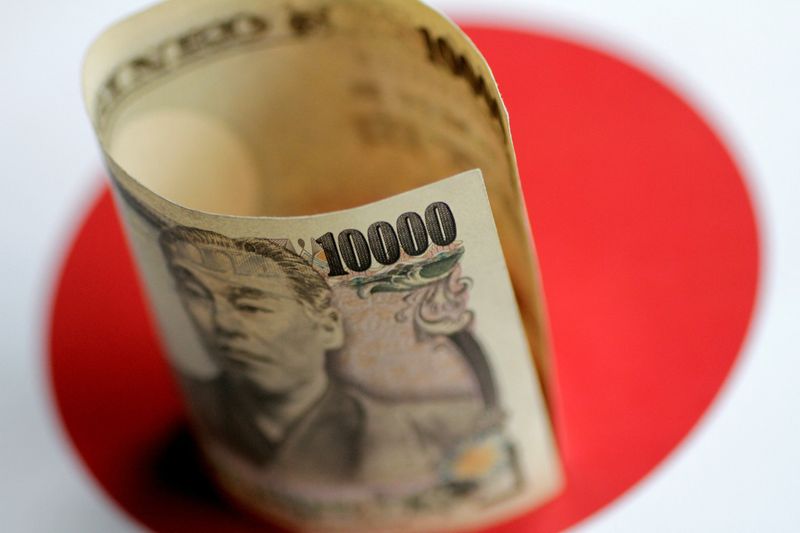By Junko Fujita
TOKYO (Reuters) - Market forces have pushed Japanese government bond yields above policy targets. The moves are the biggest test in seven years of yield control in Japan, and dealers say the central bank's dominance of trading is making the market barely functional.
Here is what is happening and what it means:
WHAT IS JAPAN'S BOND MARKET?
Consisting of more than 1,000 trillion yen ($7.9 trillion) of debt, Japan's government bond market is one world's largest, but over the past seven years of a policy called yield-curve control (YCC) has become one of the least liquid.
To stimulate lending, growth and inflation, the Bank of Japan has pinned short-term interest rates at -0.1% and 10-year yields around zero since 2016. In that period, it has three times loosened its tolerance for movement of the 10-year yield above or below zero - most recently in December, when it suddenly widened its target band from plus or minus 0.25 percentage points to plus or minus 0.5 percentage points.
Because bond yields rise when prices fall, defending the upper limit of the band has forced it to buy bonds in vast quantities, leaving it owning more than half the market.
HOW HAS THAT AFFECTED TRADE?
Trading volumes have shrunk as market participants have struggled with the BOJ's sudden and large interventions, so the market now waits on the central bank every day.
"A little after 10 a.m., we check what the BOJ will announce, and that determines the market move of the day," said Tomohiro Mikajiri, head of yen and non-yen fixed income trading in Japan for Barclays (LON:BARC).
"It is hard to take positions without checking whether the BOJ conducts emergency bond buying operations, and if so which tenors the BOJ targets, and at which prices."
Japan's yield curve - a line linking yields at increasing tenors, which in most countries is an arc with higher yields for longer-term bonds - has also grown a kink.
Because the BOJ binds only overnight and 10-year rates, market participants have priced higher yields on all other tenors, driving eight-year yields to 0.62%, above 10-year yields, and 15-year yields far above at 1.15%.
WHAT IS HAPPENING IN THE MARKET?
The sheer scale of the BOJ's ownership and buying volume, as well as short-selling from foreign investors who are betting on a policy shift, means the market has little to no role in setting benchmark debt prices or the cost of public financing.
The bank's ownership of the 368th series of 10-year Japanese government bonds is near total, at 97.0% on Jan. 10, up from 86.4% on Dec. 22, according to reports by Keisuke Tsuruta, fixed income strategist at Mitsubishi UFJ (NYSE:MUFG) Morgan Stanley (NYSE:MS) Securities.
The BOJ held 86.8% of the 367th 10-year bonds on Jan. 10, up from 81.9% on Dec. 20, according to Tsuruta.
Foreign short-selling in recent weeks has only added more pressure to an already distorted market. Interest rate swaps, which in most markets closely track sovereign bonds, rose above 1% at the 10-year tenor on Monday.
That swap yield may indicate where the 10-year bond could be if the BOJ left the market alone.
Short-term swaps have spiked, too.
"The attack on BOJ, mainly from foreign investors, continues, and that is putting upward pressure on yields," said Takafumi Yamawaki, head of Japan rates research at J.P. Morgan Securities.
WHAT DOES IT MEAN?
Given the extreme market expectations, the BOJ must either abandon its YCC policy or at least double the size of its band, to restore any semblance of market functionality analysts say.
"Even if the BOJ widened the band for the 10-year bond to 75 basis points, the yield would be pinned at 0.75% - unless overseas yields fell," said Barclay's Mikajiri.
"Unless the BOJ reduces its presence in the market and changes its stance that it is controlling the yield level, market liquidity won't improve."
For global markets accustomed to a perennially dovish BOJ and cheap yen funding, a shift this week would be a jolt.
The yen has rallied significantly since December. It has reached seven-month highs since the Yomiuri daily reported last week that the BOJ would review the side-effects of its monetary easing at this meeting.
($1 = 127.3 yen)
